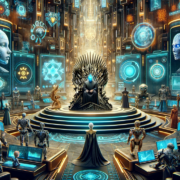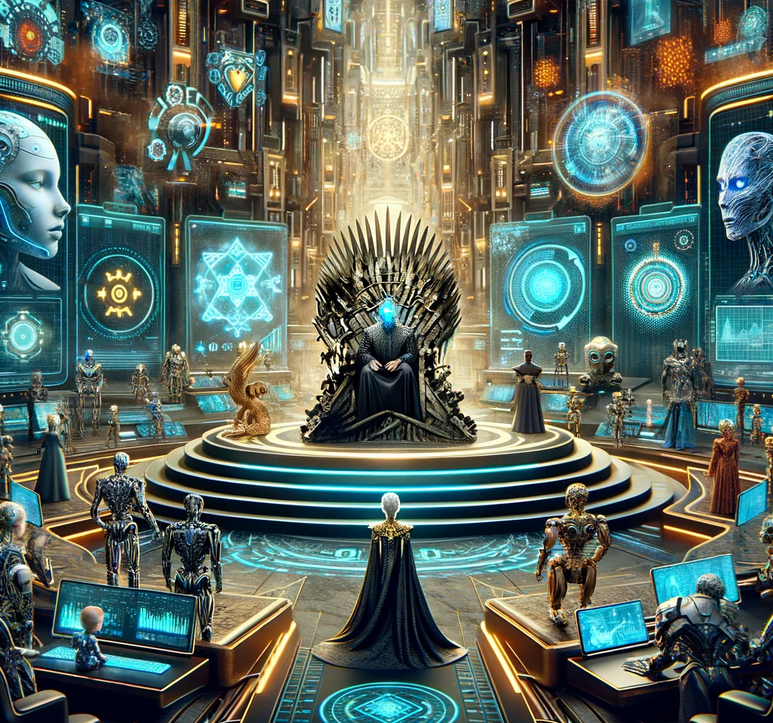AI’S GAME OF THRONES
(MSFT), (AAPL), (EA), (CSCO), (GOOGL), (PYPL), (ORCL), (INTC), (AMD), (CRM), (IBM), (BIDU), (TSLA), (AMZN), (META)
In a striking twist of corporate intrigue, the artificial intelligence sector is abuzz with the latest developments involving Sam Altman, Microsoft, and OpenAI. The narrative unfolding around Altman's sudden departure from OpenAI, the very startup he co-founded, and his subsequent shift to Microsoft reads like a thriller set in the fast-paced world of AI innovation.
On a seemingly ordinary Friday, the AI world was rocked by the news of Altman's dismissal from ChatGPT's parent company, OpenAI. The board cited a lack of "consistent candor" in his communications, an accusation that seemed to spell the end of his tenure.
However, the plot thickened as negotiations for his potential return to OpenAI began to surface, revealing a tangle of corporate strategies and personal ambitions.
Amidst this turmoil, Microsoft's (MSFT) CEO, Satya Nadella, demonstrated his strategic acumen by quickly bringing Altman into the fold to lead an advanced AI research team. This maneuver not only solidified Microsoft's position in the AI race but also retained Altman's expertise and influence within the company, thereby averting the risk of him joining a competitor.
The discussions surrounding Altman's possible reinstatement at OpenAI further complicate the narrative.
With the involvement of OpenAI's interim CEO Emmett Shear and board member Adam D’Angelo, who is also the co-founder and CEO of Quora, along with key investors like Thrive Capital, Khosla Ventures, and Tiger Global Management, the plot thickens.
The inclusion of Sequoia Capital, a top venture capital firm that’s also invested in tech giants like Apple (AAPL), Electronic Arts (EA), Cisco Systems (CSCO), Google (GOOGL), Oracle (ORCL), and PayPal (PYPL), in these discussions underscores the high stakes involved.
This corporate chess game isn't just a battle for executive talent; it's emblematic of the broader ideological struggle over AI's future direction.
Should the industry charge ahead, accelerating technological development, or should it tread more cautiously, prioritizing safety and ethics?
This debate is personified by the contrasting visions of Emmett Shear, OpenAI's new CEO, who favors a slower approach, and Elon Musk, who advocates for a pause in AI advancements.
Altman's alignment with the acceleration camp, alongside his potential return to OpenAI and involvement with Microsoft, poses a significant challenge to those advocating for a more measured approach.
This could have far-reaching implications not just for the industry's giants but for the entire ecosystem of AI development.
Microsoft's strategic gain in securing Altman and Greg Brockman, another OpenAI co-founder, also has broader ramifications for the tech and AI sector.
Giants like Intel Corporation (INTC) and Advanced Micro Devices, Inc. (AMD) could see a surge in demand for their AI-relevant chips. At the same time, Salesforce.com, Inc. (CRM) might find its AI-driven customer relationship tools increasingly indispensable.
Globally, Baidu, Inc. (BIDU) in China and International Business Machines Corporation (IBM), with its Watson AI technology, could also benefit from these shifts.
Needless to say, this is more than a corporate reshuffle; it's a transformation that could reshape the competitive landscape in AI technology, with implications for companies and investors alike.
This development also raises pertinent questions about the future trajectory of AI and the role of major players in shaping this path.
Smaller AI startups may find competing for talent and recognition challenging in this intensified environment. Traditional software and IT service providers not heavily invested in AI could increasingly find themselves at a disadvantage.
The automotive sector is another arena where the impact of these developments could be profound.
Legacy automakers that have been slow to integrate AI, particularly in autonomous driving, might find themselves lagging behind more technologically agile competitors like Tesla (TSLA).
For tech giants like Alphabet Inc. (GOOGL) and Amazon.com Inc. (AMZN), this episode is a double-edged sword.
While they stand to benefit from the overall expansion of the AI market, Microsoft's bolstered position presents a formidable challenge.
Similarly, Meta Platforms, Inc. (META), with its significant investments in AI and virtual reality, may attract interest but also faces stiffer competition.
As AI continues to cement its role across various industries, the terrain is set for rapid and unpredictable changes. These transitions will undoubtedly have far-reaching implications for these companies and the broader market, necessitating close monitoring by investors and industry watchers alike.
Ultimately, the story of Altman, Microsoft, and OpenAI isn't just a momentary headline; it's a microcosm of the transformative power of AI, heralding a future where innovation, competition, and collaboration merge to drive progress in ways we are only beginning to comprehend.



